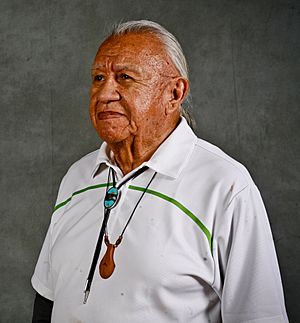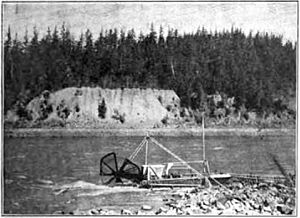Washington v. Washington State Commercial Passenger Fishing Vessel Association facts for kids
Quick facts for kids Washington v. Washington State Commercial Passenger Fishing Vessel Ass'n |
|
|---|---|

|
|
| Argued February 28, 1979 Decided July 2, 1979 |
|
| Full case name | Washington v. Washington State Commercial Passenger Fishing Vessel Ass'n |
| Citations | 443 U.S. 658 (more) |
| Argument | Oral argument |
| Holding | |
| The usual and accustomed grounds clause provides Indian fishers with a certain share of the anadromous fish in a run. The Fish and Game Departments could also be required to make rules protecting this right due to the Supremacy Clause. | |
| Court membership | |
| Case opinions | |
| Majority | Stevens, joined by Blackmun, Brennan, Burger, Marshall, White |
| Dissent | Powell, joined by Stewart, Rehnquist |
Washington v. Washington State Commercial Passenger Fishing Vessel Association was an important case decided by the U.S. Supreme Court in 1979. This case was all about the fishing rights of Native American tribes in Washington State. The Court had to decide what the old treaties meant for how much fish Native Americans could catch.
The Supreme Court decided that a special part of the Stevens Treaties, called the usual and accustomed clause, meant Native Americans had a right to a share of the fish, not just places to fish. Specifically, it said that fish like salmon, which swim up rivers from the ocean (called anadromous fish), should be shared fairly. The Court also said that its decision was more important than state laws. This meant Washington's Game and Fisheries Department might need to create rules to make sure Native American fishing rights were protected.
The decision was 6 votes to 3 in favor of the Native American tribes' interpretation of the treaties. Justice John Paul Stevens wrote the main opinion for the Court.
Contents
A Look Back: Fishing Rights History
Early Treaties and Promises
Back in 1853, a man named Isaac Stevens became the governor of Washington Territory. He worked to create many treaties with the Native American tribes in the area. Often, the tribes didn't fully understand all the words in these treaties. Because of this, they ended up giving up a lot of their land.
A very important part of these treaties said that Native Americans could keep fishing at "all usual and accustomed grounds ... in common with all citizens of the Territory." At that time, people thought there would always be endless fish.
The Winans Case: Protecting Fish Supply
This special fishing clause was used to protect Native American fishing rights in 1905. In a case called United States v. Winans, a large device called a fish wheel was built in Yakima Territory. This wheel caught almost all the fish, stopping the Yakima tribe from getting any. The court decided that the "usual and accustomed places" part of the treaty protected not just the fishing spots, but also the actual supply of fish.
The Fish Wars and the Boldt Decision

Over the next 50 years, the number of salmon in the rivers went down a lot. In the 1960s and 1970s, Native Americans were often arrested for fishing. This led to what became known as the Fish Wars. Many Native Americans protested by fishing on the rivers, even if it meant being arrested. The situation became very tense.
Because of this conflict, the U.S. government sued Washington State to support the Native Americans' right to fish. The "usual and accustomed grounds" part of the treaties was central to this lawsuit.
In the district court, Judge George Hugo Boldt made a big decision. He agreed with the Native Americans. He said that the state had to give tribes both places to fish and enough fish to catch. Judge Boldt decided that Native Americans were entitled to 50% of the fish to help them have a "moderate living." This decision became known as the Boldt decision.
Challenges to the Boldt Decision
After Judge Boldt's ruling, the decision was challenged two times in the State Supreme Court. In these cases, the state court said that the federal ruling could not be followed. This caused a lot of confusion and conflict between state and federal laws.
Because of this disagreement, the U.S. Supreme Court decided to review the case. This led to the Washington v. Washington State Commercial Passenger Fishing Vessel Association case, which confirmed and clarified the fishing rights of Native American tribes.
 | Shirley Ann Jackson |
 | Garett Morgan |
 | J. Ernest Wilkins Jr. |
 | Elijah McCoy |


